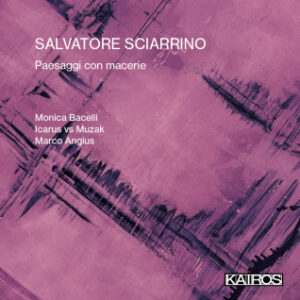Sciarrino on Kairos (CD Review)
Salvatore Sciarrino
Paesaggi con macerie
Kairos
Monica Bacelli, mezzo-soprano
Icarus vs. Muzak, conducted by Marco Angius
Salvatore Sciarrino (b.1947) is one of today’s most prominent Italian composers. His work encompasses the effects and inflections of second modernity, frequently alongside transcriptions of earlier music. This combination yields singular pieces from a composer who has a distinctive and compelling voice. Icarus vs. Muzak, conducted by Marco Angius, adopts well the various facets of Sciarrino’s music, performing the quotations with clarity and the frequent contrasts energetically.
The influences incorporated on Paesaggi con macerie, Sciarrino’s latest portrait CD for the Kairos imprint, are a disjunct pairing, Chopin and Gesualdo. Passagi con macerie (2022) is a three movement work written in homage to Chopin. His Mazurkas are presented in various guises – snatches of quotation, full length quotes, and, in the last movement, the group plays the famous Mazurka in C-major, distressed by percussion to sound like a skipping Victrola. Surrounding the Mazurka material are the special effects that also typify Sciarrino’s work. Few composers work so well with borrowed material, incorporating into a contemporary aesthetic.
Mezzo-soprano Monica Bacelli joins the ensemble for Le Voci sottovetro (1999), a piece inspired by stories of genies in bottles at the bottom of the ocean and by the music of Gesualdo. Sciarrino transcribes the madrigalisms found in Gesualdo’s work, creating a vivid scoring. Bacelli is an expressive singer with a generous lower register. Her sense of phrasing is both detailed and emotive, a delicate balancing act.
Exporazione del bianco II (1986) is based on a poetic image, the moment of blindness after a bolt of lightning. The piece doesn’t employ quotation, instead using extended techniques in pointillistic fashion to create a fragmentary score. Icarus vs. Muzak is in their element here, performing the score’s terse, rhythmically intricate entrances and overtone-based harmonies with assuredness.
The recording concludes with Gesualdo senza parole (2013), a four-movement piece written to commemorate the 400th anniversary of Gesualdo’s death. Instrumental transcriptions of Gesualdo’s madrigals, scored to bring out colorful textures and dovetailing melodies, for the most part eschew extended techniques, the occasional glissando or harmonic sufficing. Antiphonal passages and dynamic echoes give the image of these pieces being sung. The transcriptions are expertly done, making their renditions seem nearly inevitable. The fourth movement, initially an addition to the piece, is described by Sciarrino as “an insolent concertino for marimba and six instruments.” Here he reincorporates effects and pointillism, frequently breaking up Gesualdo’s music into fragments. Upon the marimba’s entry, a madrigal transcription enters, returning the ambience to that of former movements. Gradually, transcription and extensions converge, finishing the piece in the distinctive polyglot ambiance that is Sciarrino’s preferred approach.
Paesaggi con macerie is a fascinating addition to Sciarrino’s catalog. The combination of extraordinary progenitors and Sciarrino’s expert way of handling them makes this one of my favorite recordings of 2023.
-Christian Carey
